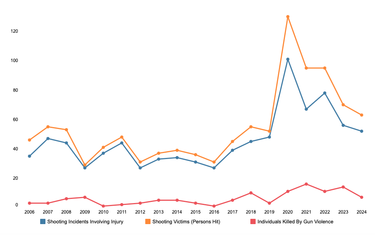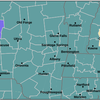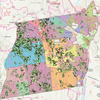State program to curb gun violence awards $2M for Albany
ALBANY COUNTY — Two organizations in the city of Albany received a share of $20.7 million in state funds to curb gun violence.
Albany Medical Center got $262,310 and Trinity Alliance of the Capital Region got $1,820,329.
Trinity Alliance says its mission is “to provide services to the community that will support and promote healthy families, adults and children. Our agency is dedicated to improving the neighborhood as a setting for family life, contributing to health and well-being, and promoting education and employment as a means of self-development.”
Trinity Alliance also received $860,134 for its work in Troy.
Those were the only Capital Region allocations.
These grants to community-based organizations and hospitals fund outreach workers, hospital responders, social workers, and case managers who are, according to a release from the governor’s office, “credible messengers and work with individuals at risk of gun violence, connecting them with support and services to change behavior and increase opportunities ….
“They work with teens and young adults to detect and defuse disputes before they escalate; respond to shootings to prevent retaliation through mediation and assist family members of those who have been injured or killed; and mentor youth involved with the program to set goals and connect them with educational and job opportunities as well as other services.
“The programs also engage the community, religious organizations and clergy, and local businesses by sponsoring anti-violence marches, job fairs, block parties, sporting events and other community gatherings.”
The state’s SNUG — which is not an acronym but, rather, the word “guns” spelled backward — Street Outreach Program was started in 2009.
Three years earlier, in 2006, the state had started tracking incidents of gun violence outside of New York City.
The state’s SNUG program uses a public health approach to address gun violence by identifying the source; interrupting transmission; and treating individuals, families, and communities affected by the violence, according to the governor’s office.
The state’s Division of Criminal Justice Services tracks shooting data in these “SNUG zones” and last year, those zones collectively reported significant, double-digit decreases in shooting victims, individuals killed by gun violence and shooting incidents with injury when compared to 2023.
Governor Kathy Hochul announced last week that gun violence in communities participating in the state’s Gun Involved Violence Elimination, known as GIVE, initiative declined to its lowest level on record last year.
Shooting incidents with injury declined 28 percent in 2024 compared to 2023, and the number of individuals injured declined 25 percent, with 238 fewer people harmed by gunfire.
In Albany County in 2024, according to GIVE data, there were 52 shooting incidents in which people were injured, down 7 percent from 2023; 63 people were injured by gunfire, down 10 percent; and seven people were killed by gunfire in 2024.
GIVE jurisdictions account for roughly 90 percent of violent crimes involving firearms and 85 percent of violent crime reported outside New York City.
SNUG also embeds social workers and hospital responders at Level One trauma centers in Albany, Buffalo, the Bronx, Rochester, and Syracuse. In the aftermath of a violent incident, the social workers work with individuals and families to offer support, services, and connect them to the SNUG program in their communities for more help.
New staff must complete 40 hours of training and new supervisors complete 32 hours of management training. All staff must also complete 40 hours of professional development training annually.
This ongoing training and support, according to the governor’s office, help ensure that the program operates consistently across all SNUG sites despite being operated by different community-based organizations and hospitals.
“The investments in these programs allow cities like Albany to wisely make strategic choices to get resources on the ground, establish connections with our neighbors, and allow alternative approaches to focusing on public safety,” said Albany Mayor Kathy Sheehan in the release. “Just this week at my State of the City we highlighted a reduction of crime of 3 percent compared to the five-year average and a reduction of 21 percent since I assumed office.”
“As one of the original supporters of SNUG, which started here in the Capital Region, I have worked closely with Trinity Alliance and those who are part of SNUG and have seen the positive impact of the program,” said Assemblyman John T. McDonald III in the release. “That is why I am appreciative of the governor's support to continue to grow the program, including in the city of Troy where the program has taken roots and is welcomed by the public safety team. The data validates the critical need and impact of the program which is making our communities safer.”
“Investing in evidence-based programming and on-the-ground resources is exactly how we combat the scourge of gun violence,” said State Senator Patricia Fahy in the release. “Partnering with law enforcement, community-based interrupters in cycles of violence like the Trinity Alliance of the Capital Region and increasing the state’s commitment to funding these initiatives is why we’re seeing gun violence rates drop in communities across the state.”



